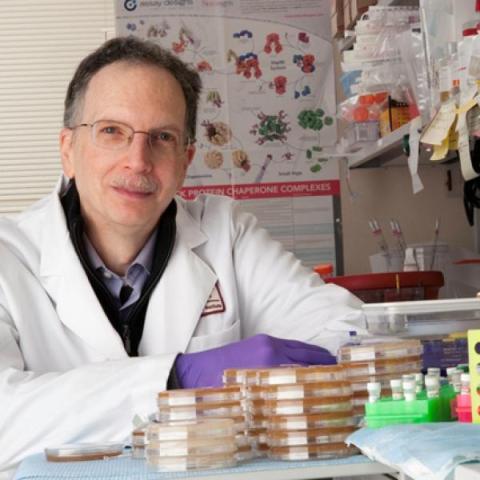
Len Neckers, Ph.D.
For over 40 years, Len Neckers, Ph.D., worked to develop molecularly targeted therapeutic approaches to modulate cancer cell growth and survival. He is known as an excellent mentor dedicated to furthering the careers of other cancer researchers throughout his time at the NIH. Neckers retired from NCI in November 2024.
Neckers received his bachelor’s degree in biology from Clark University and went on to receive his Ph.D. in neurochemistry from the University of Connecticut. In 1974, he came to the NIH as a postdoctoral fellow at the National Institute of Mental Health (NIMH). Several years later, he became a senior staff fellow at NIMH, where he was able to measure serotonergic neurotransmitter turnover in individual brain nuclei for the first time and use this technique to map drug response of distinct serotonergic pathways in the brain.
In 1981, Neckers joined the NCI as an expert in the Laboratory of Pathology. He then became a principal investigator and held this position in the Clinical Pharmacology Branch and Cell and Cancer Biology Branch before becoming a senior investigator in the Urologic Oncology Branch in 2003.
Throughout his career, Neckers has been regarded as an early proponent of the importance of translational research. He is best known for his work on the molecular chaperone heat-shock protein 90 (Hsp90), which led to its identification and validation as a non-oncogenic target in cancer. Neckers also identified numerous oncogenic client proteins of Hsp90, findings that led to an understanding of how a single protein can be manipulated to target multiple oncogenes simultaneously. There are now over 200 known Hsp90 clients that have been identified as a result of Neckers’ work, many of which are oncogenes.
This work led directly to the first phase 1 clinical trial of an Hsp90 antagonist as an anticancer agent. Today, Hsp90 inhibitor drugs have been distributed to thousands of patients in clinical trials across the world, yielding success in breast cancer, non-small cell lung cancer, leukemia and multiple myeloma. Neckers has investigated the posttranslational modification of the Hsp90 chaperone in cells, which revealed potential unrecognized effects of such modifications on Hsp90 drug resistance and efficacy.
He was also instrumental in the discovery of the mechanism of oncogenesis in fumarate hydratase mutant hereditary leiomyomatosis and renal cell carcinoma and was considered a pioneer in the development of oligonucleotide-based therapeutic strategies, including the first anti-oncogenic antisense oligomer, anti-c-myc. His landmark work provided the foundation for a therapeutic approach which has now become the standard of care worldwide for this form of aggressive renal cancer.
“Dr. Neckers is an outstanding translational scientist who devoted almost 50 years to the development of novel forms of cancer treatment,” says W. Marston Linehan, M.D., Chief of the Urologic Oncology Branch and longtime colleague of Neckers. “He is one of the most intuitive scientific thinkers I have ever worked with; many times I would explain a scientific problem to Len and very quickly he would come up with a way to address it.”
“Len was also a beloved mentor to a generation of young scientists,” says Linehan. Throughout his career, Neckers prioritized his efforts to collaborate with colleagues and provide mentorship to young scientists in his lab. Raju Chelluri, Staff Clinician in the Urologic Oncology Branch, worked with Neckers in the lab from 2014 to 2017 as part of the Medical Research Scholars Program. He attributes his return to CCR to his time being mentored by Neckers.
“Working with Dr. Neckers was one of the most professionally gratifying experiences I've had in my career thus far,” he says. “It's wonderful to have a senior investigator who believed in me, gave me the space to think and learn and make mistakes without fear of repercussion. He allowed us to grow at our own pace while still directing and supporting us. My time with Len is what got me interested in pursuing a surgeon-scientist career and coming back to NIH as an attending surgeon.”
In addition to his laboratory research, Neckers holds multiple patents and is a member of several societies, including the American Society for Pharmacology and Experimental Therapeutics and Cell Stress Society International, where he served as president from 2018 through 2020. Neckers has also received multiple NIH awards throughout his career for mentorship, innovation, technology and scientific merit.
A full list of his publications can be found here.
Dr. Leonard Neckers retired from the NIH on November 30, 2024.